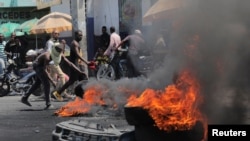The last day of the 52nd General Assembly of the Organization of American States (OAS) in Lima ended with the approval of a series of declarations, including two that addressed the political crises in Nicaragua and Haiti, respectively.
The highest body of the OAS asked the regime of Daniel Ortega to accept offers of regional and international cooperation so that his country returns to the channels of the inter-American system.
In November last year, Nicaragua resigned from the regional forum after the unanimous condemnation of the international community for the re-election of Ortega, who imprisoned his main rivals to secure a fourth presidential term.
Precisely, it was requested that the government release the more than 200 political prisoners and cease the judicial harassment against journalists, NGOs and members of the catholic church. The resolution was promoted by Canada, Antigua and Barbuda, Chile, Costa Rica and the United States.
There were countries like Honduras that, during the debate for the approval of the draft declaration, stated that Nicaraguans should solve their own problems without external interference.
In the assembly, a resolution was also announced so that the countries of the region bet on providing direct support to Haiti, which, currently, experiencing a security crisis due to the advance of drug trafficking and criminal gangs.
Among the recommendations, it was proposed that there be training in the Haitian police to avoid possible violations of the human rights of citizens who are not involved in criminal acts, but only protest peacefully in the country due to the rise in fuel prices. .
Venezuela, the Falklands and more
During the final plenary session, a declaration was approved that demands the immediate release of the 245 political prisoners, according to the NGO Foro Penal, which is in Venezuela.
Brazil, Canada, Chile, Costa Rica, Ecuador, the United States, Guatemala, Paraguay and Uruguay promoted this project to press for a political solution to the crisis that began in 2017 with Nicolás Maduro, who became the successor of Hugo Chávez in the can.
Another issue that deserved attention, and a subsequent approval of a declaration, is the conflict over the Malvinas Islands. The OAS General Assembly agreed that Argentina and the United Kingdom reestablish the negotiating tables to find a solution to the controversy that has lasted more than 30 years.
“The inalienable territorial rights of the Argentine Republic over the Malvinas, South Georgia and South Sandwich Islands go together with the position of this region; a peaceful and negotiated solution is needed,” said Secretary General Luis Almagro, after approving the ” renewed achievement for Malvinas” which means a “Latin American cause”.
Among the other declarations supported by the forum are the implementation of mechanisms to combat food insecurity, proposals to address mental health and consolidate the empowerment of women in political spaces in Latin America.
IACHR reports
On the last day of the OAS General Assembly, which began on Tuesday, reports on the human rights situation in the region in the last year were also presented.
Julissa Mantilla, president of the Inter-American Commission on Human Rights, pointed out in her speech that “the pandemic has exacerbated the situation of historically vulnerable groups and even more so in a context of economic recession and climate change.”
The commissioner reported that they received 2,327 study requests, of which 350 admissibility reports and 75 substantive reports were approved. In addition, she added that 40 cases were referred to the Inter-American Court of Human Rights.
On the other hand, Mantilla revealed that his entity carried out a study of the 35 member countries of the OAS and found actions that sought to weaken institutions that defend human rights, violence against social leaders and journalists, the criminalization of citizen protests and the recent reaffirmation of discrimination against women, boys, girls, the LGTBI community and disabled people.
Ricardo Pérez, president of the Inter-American Court of Human Rights, said that in the last year they gave rulings on issues such as access to vaccines for migrants, violence against trans women, the relationship between companies and human rights, health reproductive rights of women and new standards of freedom of expression.
The jurist recalled that they issued opinions regarding consultations such as the indefinite presidential re-election regarding the case of El Salvador, where Nayib Bukele wants a new mandate despite the fact that it is prohibited by the Constitution. In this regard, Pérez pointed out that it is “contrary to the American convention.”
“The court has been open and dialoguing despite the circumstances experienced in the last two years due to the pandemic,” he closed his speech.
Connect with the Voice of America! Subscribe to our channel Youtube and turn on notifications, or follow us on social media: Facebook, Twitter and Instagram.


![[Img #74662]](https://thelatestnews.world/wp-content/uploads/2024/12/Organisms-with-the-shortest-life-150x150.jpg)












